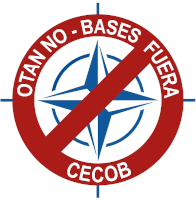A call for the creation of an Anti-imperialist Front
Documents approved at the Meeting for the Founding of the Anti-imperialist Front on 2 December 2017 in Madrid, with the amendments suggested by the attenders.
Effective as of 9 January 2018
A call for the creation of an Anti-imperialist Front
PRESENTATION
We are at war. It was with that slogan that over two years ago we began to work all over the country trying to draw attention to a war that the mass media situate beyond our frontiers, concealing our involvement and its consequences.
Over this time we have found that:
-
As militants we stick to our own particular areas of activity, without considering the magnitude and scale of the war. We address only isolated sectors.
-
Without realising it we contribute to the logic of fragmentation, pursuing multiple actions that draw attention only to parts of the war.
-
We think that unity of action means others should join our cause.
-
We are unable to cope with all the action and challenges that we face day-to-day.
In view of this situation, we need to:
SET COMMON GOALS
ESTABLISH PRIORITIES
COORDINATE OUR PARTIAL STRUGGLES so that they connect with a common struggle.
To achieve this we need to:
-
Agree on common criteria as to the meaning and scope of the imperialist war
-
Share a common language
-
Build a common platform for coordination – action and thought: FAI (Frente Antiimperialista para la Acción y el Pensamiento – Anti-imperialist Front for Action and Thought)
We would like to offer you the following considerations with a view to setting out together a number of common positions from which to start building an Anti-imperialist Front.
1. Capitalism-imperialism-crisis-war
Imperialism is the form that capitalism adopts at a given point in its historical development. It is the logic of capitalist accumulation that drives imperial expansion, regardless of the will of the particular historical agents.
The crisis comes when the existing mechanisms are no longer sufficient to maintain accumulation. The crisis reveals the problem of capitalism, but it is also the pretext used by the powerful to impose measures that suit their interests.
Within the empire the crisis manifests itself in increased equality as a result of the mechanisms of domination and subjection in labour relations, cuts in public services, attacks on rights and freedoms, increased repression and militarization, and lastly the upsurge of fascist movements.
Outside, war is the historical companion of crisis, as a means of forcefully occupying territories of strategic value or rich in raw materials, opening up trade routes, conquering markets and blocking the expansion of rivals. Imperialist war is the basic response to crises of capitalism.
2. World-Wide War
We are at war, even if the battle-fronts are beyond our frontiers. The Spanish state is one of the parties responsible for this war. We are not spectators—we are leading actors in the war.
This is the World-Wide War, which adopts more or less covert or high-tech forms: psychological, economic or media warfare, parliamentary coups, coups d’état, drone warfare, use of mercenaries or proxy armies, and lastly, open military aggression.
It is a war unleashed by the Western imperialist coalition led by the USA, which seeks to dominate countries, regions or peoples by any means, economic, political or military, through its chief instrument, NATO, which now reaches as far as Colombia.
3. Victims and resistance
We are told to see the victims of wars, the forced migrants who pile up on our frontiers, as a ‘problem’, but we are not told how they are the tangible outcome here of the way that imperialism views the world and acts. We are shown their living circumstances in isolation from the ultimate causes of these, and we are encouraged, appealing to our sentiments, to renounce any analysis or rationale.
All processes of domination can generate resistance, both in subject areas and inside the empire. Resistance is the only way to confront imperialism, and to resist entails a political commitment: to build a different society by resisting.
Within the Spanish state the working class has developed numerous forms and expressions of resistance against the aggressions of capital. And yet, no movement that claims to be a vehicle of change can really be such unless its goals include the struggle against imperialism and for internationalism, thus recovering the notion of socialism as the ultimate frontier to cross
Internationalism is absolutely essential for any anti-imperialist struggle, a commitment to break with the system of structural domination and dispossession. Internationalism is the opposite of imperialism: it is the recognition of other nations as equals, respecting their differences; it is founded on cooperation and mutual benefit and implies class solidarity.
Exploitation and domination are necessary features of the imperialist system, which always acts to prevent any change in that situation. It is therefore essential that anti-imperialism be an integral part of any policies in favour of the people and any processes of social change.
To argue that in the face of imperialist expansion one is neither for not against is to side clearly with empire. Imperialist strategy promotes equidistance.
4. State complicity and public passivity
The Spanish state is part of the imperialist coalition, and a leading participant at that. Our territory hosts military bases and command centres essential to the imperialist military structure; we are a member of NATO and we have taken part in 50 missions in 30 countries, with 138,000 troops and 160 dead.
And yet, for the vast majority of the population not only are we not at war but we are making an effective contribution to peace and we increasingly accept growing militarization.
This is possible because we are presented with reality in piecemeal fashion, so that it is hard to grasp. Social organization, solidarity and resistance are fragmented so as to facilitate control and prevent the emergence of a unified response.
5. Towards an Anti-Imperialist Front
Any movement has its own specific characteristics, difficulties, historical baggage and circumstances. At the same time there are common features and needs that can help enhance the strength and potential of each one if we can manage to cooperate and develop internationalism.
Only the concentration of forces can provide the foundations for a movement with real impact. It is not just a matter of setting common goals, but of lending coherence to all the partial struggles, through a common internationalist, anti-fascist and anti-imperialist perspective.
For all these reasons we believe it is necessary to build a single, permanent structure imbued with a will to make a social and political impact and an active commitment to promoting resistance through a shared anti-imperialist consciousness.
The Anti-Imperialist Front would thus address two equally necessary aspects: firstly, it would contribute to theoretical debate, especially among militants of the left, to clarify concepts and interpretations of events within an anti-imperialist framework; and secondly it would articulate an essential capacity to pressure for political resistance with actions of agitation, propaganda and mobilization, and to promote internationalist relations with social movements and anti-imperialist organizations.
(NB: The arguments presented here are elaborated more fully in the attached document; here they have been briefly outlined as a call to action)





